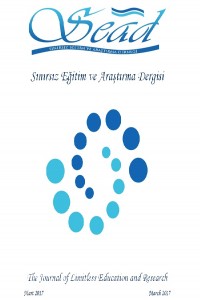Abstract
Bu
çalışmanın amacı, eğitim alanında gerçekleştirilen araştırmalarda benimsenen
bilimsel yönteme bağlı olarak ortaya çıkan sınırlılıkları tartışmaya açmaktır.
Bilimsel yöntem, araştırmacılara çalışmalarını planlama, yürütme ve yorumlama
konusunda rehberlik etmektedir. Ancak, bilimsel yöntemi izlemek ve belirli bir
yöntemi benimsemek bazı sınırlamaları da beraberinde getirmektedir. Eğitim
araştırmaları çalışma alanı insan olan, çoğu zaman kamuyu ilgilendiren konuları
araştırma konusu yapan ve bilimsel araştırma yöntemlerinin benimsendiği
çalışmalardır. Eğitim araştırmalarının kendine özgü önemi geleneksel bilimsel
yöntem anlayışını değişime zorlamış, fen bilimlerinde uygulandığı şeklinden
belirli oranda farklılaştırmış ve özellikle daha baskın olan etik sınırlamalar
getirmiştir. Tüm sınırlılıklara rağmen eğitim alanında yapılan araştırmalarda
bilimsel yöntemin benimsenmesi evrensel bilgi birikimini arttırmaktadır. Eğitim
araştırmalarında benimsenen bilimsel yöntem daha sistematik ve titiz hale
geldikçe eğitim bilimlerinin sahip olduğu bilimsel statüde artış kaçınılmaz
olacaktır.
Keywords
References
- Çepni, S., (2007). Araştırma ve Proje Çalışmalarına Giriş. Trabzon: Celepler Matbaacılık.
- Creswell, J. (2015). Educational Research : Planning, Conducting, and Evaluating Quantitative and Qualitative Research. Boston: Pearson.
- Ekiz, D. (2003). Eğitimde Araştırma Yöntem ve Metotlarına Giriş, Ankara, Anı.
- Gall, M. , Gall, J. , & Borg, W. (2007). Educational Research : An Introduction. Boston: Pearson/Allyn & Bacon.
- Lichtman, M. (2013). Qualitative Research in Education : A User's Guide. Los Angeles ; London: SAGE Publications.
- McMillan, J. , & Schumacher, S. (2001). Research in Education : A Conceptual Introduction. New York: Longman.
- Reif, F. (2008). Applying Cognitive Science to Education : Thinking and Learning in Scientific and Other Complex Domains. Cambridge, Mass.: MIT Press.
- Schreiber, J. , & Asner-Self, K. (2011). Educational Research : The Interrelationship of Questions, Sampling, Design, and Analysis. Hoboken, NJ: Wiley.
- Wallen, N. , Fraenkel, J. (2000). Educational Research: A Guide to the Process. Mahwah, N.J.: Lawrence Erlbaum Associates.
- Wellington, J. (2000). Educational Research : Contemporary Issues and Practical Approaches. London; New York: Continuum.
Abstract
The purpose of this study is to open up a debate on emergencies
depending on the scientific method adopted in research conducted in the field
of education. The scientific method is to guide for researchers ın order to
plan, execute and interpret of their study. However, following the scientific
method and adopting a particular method are brought with some limitations.
Educational research is the study which has the research field consisted of
human, makes the research issue among the issues related to public and adopted
the scientific research methods. The specific significance of the educational research
topics have forced the scientific method for a formation and differentiated
from the way that had been applied in natural sciences and brought some major ethical
limitations. Despite all limitations, the adoption of the scientific method in
educational research applications has made great progress in our universal
knowledge. In educational research, it is inevitable to make the scientific
method more systematic and rigorous and to increase the scientific status of educational
sciences.
Keywords
References
- Çepni, S., (2007). Araştırma ve Proje Çalışmalarına Giriş. Trabzon: Celepler Matbaacılık.
- Creswell, J. (2015). Educational Research : Planning, Conducting, and Evaluating Quantitative and Qualitative Research. Boston: Pearson.
- Ekiz, D. (2003). Eğitimde Araştırma Yöntem ve Metotlarına Giriş, Ankara, Anı.
- Gall, M. , Gall, J. , & Borg, W. (2007). Educational Research : An Introduction. Boston: Pearson/Allyn & Bacon.
- Lichtman, M. (2013). Qualitative Research in Education : A User's Guide. Los Angeles ; London: SAGE Publications.
- McMillan, J. , & Schumacher, S. (2001). Research in Education : A Conceptual Introduction. New York: Longman.
- Reif, F. (2008). Applying Cognitive Science to Education : Thinking and Learning in Scientific and Other Complex Domains. Cambridge, Mass.: MIT Press.
- Schreiber, J. , & Asner-Self, K. (2011). Educational Research : The Interrelationship of Questions, Sampling, Design, and Analysis. Hoboken, NJ: Wiley.
- Wallen, N. , Fraenkel, J. (2000). Educational Research: A Guide to the Process. Mahwah, N.J.: Lawrence Erlbaum Associates.
- Wellington, J. (2000). Educational Research : Contemporary Issues and Practical Approaches. London; New York: Continuum.
Details
| Subjects | Studies on Education |
|---|---|
| Journal Section | Makaleler |
| Authors | |
| Publication Date | March 15, 2017 |
| Submission Date | March 13, 2017 |
| Acceptance Date | March 15, 2017 |
| Published in Issue | Year 2017 Volume: 2 Issue: 1 |


